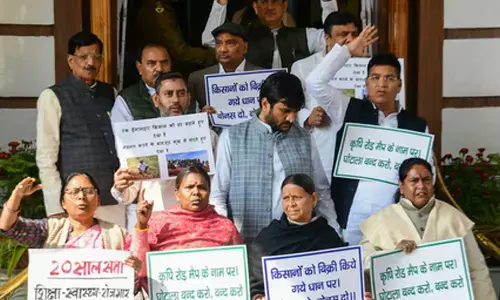Arming social sector in the market

Arming social sector in the market
In 2018, Indian philanthropic spending was valued at Rs 70,000 crore of a Rs 1,98,95,703 crore economy. That’s a 0.35 per cent share
In 2018, Indian philanthropic spending was valued at Rs 70,000 crore of a Rs 1,98,95,703 crore economy. That's a 0.35 per cent share. This is a frightening statistic, given that philanthropy is the social sector's largest source of revenue, both foreign and domestic. The evidence is in the numbers: something about the social sector's culture isn't working. Something in the way India's NGOs operate is holding them back from becoming as powerful economic players as their corporate counterparts.
Having worked in both sectors, I find that corporate culture has a few tricks up its sleeve that NGOs have been slow to embrace. Incentivising, delegating, and vision-creation are among the metrics in which the corporate sector scores well. Unfortunately, the internal policies that allow corporates to succeed in these metrics have not found their way into the social sector in a sizeable manner. In other words, year after year, India's NGOs are bringing knives to the corporate gun fight.
Of course, there are organisations that defy this characterisation. The Bill and Melinda Gates Foundation knows how to incentivise innovation. Akshaya Patra Foundation has cracked how to scale up human power, quickly and effectively. The/Nudge Foundation has a clear-cut vision and goals. However, these are the exceptions and it is interesting to note how many such exceptions are often led by personnel familiar with corporate operating culture.
So how can the social sector as a whole become more attractive to consumers, employees, investors, and other stakeholders? What will it take for India's social sector to wrestle away market share from businesses? The answer lies in investment. Like any other product, delivering development requires investing in the people, processes, and systems that are meant to facilitate the operation. Some of the ways this investment can happen are:
1. Have a two-fold vision and goal structure
In my years of working in this space, I've found that India's social sector lacks a culture of vision creation and goal-alignment. An efficient corporate structure has a well-defined organizational vision and under it more specific regional/departmental goals.
Take Company X, which manufactures and sells cars. The organisational vision is to sell the most cars. However, a regional manager for Territory Y understands that, under this overarching vision, their Regional Goal is to capture say 20 per cent of Territory Y's market share. This specific goal will vary for other regions, depending on their situation, all emanating from Company X's umbrella vision.
This goal-alignment with the larger organisation is missing among NGO workforces. Rather, I find that employees tend to focus on what they can contribute at only the individual level. Few ask "What can I do for the Organisation's Vision?" Thus, the practices of vision-creation and goal-alignment would provide a solid framework for NGO operations in multiple regions and allow the organisation to function better when scaling.
2. Make recruitment scientific. Invest in market-value salaries, incentives, and skills development
There are exceptions, but the intersection between social sector jobs and well-paying jobs is slim. Much of the brilliant talent entering the job market is sucked up by commercial organisations willing to pay market salary even before they've graduated. On the other hand, NGOs put out JDs simply hoping someone will apply despite an offer that's 40 per cent of market salary. No wonder we rarely see NGOs at campus placements, if at all.
Leaders who reach a certain point in their career are more than willing to start their journey of creating social change but are unable to make the shift to the social sector due to the lifestyle changes it will entail because of lower remuneration In this unfortunate beggars-can't-be-choosers scenario, social sector organisations are often forced to compromise on the skill-sets they require from applicants.
This only serves to further the dearth of skilled persons in the sector, consequently hampering the organisation's efficiency and growth. Thus, the first step is to have a codified system of identifying best-fit candidates for each role specifically, as well as for the organisation as a whole. The next step would be to begin compensating these skilled professionals with competitive salaries. The same goes for bonuses, which are practically non-existent among social sector organisations.
Corporate employees have many incentives to perform better, while NGO employees are unfairly expected to perform solely out of duty, the social good being fulfilment enough. How then can we expect an NGO to compete with corporates for skilled labour?
Of course, it is not all at the hands of internal company policy. As my article on the newest FCRA Amendment explains, many external factors also contribute to how much NGOs can spend on overheads such as salaries and incentives. Notwithstanding these necessary changes in the law, the culture of NGOs to be frugal with their staff must also be re-evaluated.
And the investment can't stop at employment. NGOs also need to begin allocating a larger share of their budget to skills-development of existing staff. Especially for fields like management, employers encourage and often sponsor their employees to obtain certifications in skills beyond their degrees.
This culture is near non-existent in the social sector, for a large part because the availability of courses for NGO management is only a fraction of that of business courses. Thus, the sector collectively must invest in not only producing such knowledge resources but also in disseminating them through their networks.
This slow but imperative process will deliver results multifold and save the NGOs resources in the long-run by delivering swiftness and efficiency through the now better-skilled workforce.
3. Delegate
Have you ever noticed how Indian NGOs are almost invariably woven around a single or handful of individuals? Usually the founders, a select pair or two will have established and seen an NGO to its death. They govern all decisions, they approve all plans, and they have the veto.
The corporate space doesn't function this way. Often, the monetary weight of a decision determines in whose bucket it falls. Thus, only decisions involving a sizable chunk of the budget fall in the Founders' buckets, allowing a diverse set of sensibilities to be involved in determining where the organisation is headed. New ideas have scope and a monochrome path is avoided. India could benefit from the new creative youth taking more responsibility in charting our NGOs' paths.
4. Plan succession
It follows from the previous point that NGOs are often born and die under the same leadership. Of course, the corporate space also has its fair share of dynastic enterprises. But those entities and the social sector could take notes from companies with more dynamic leadership. A well-planned succession framework would go far in ensuring NGOs aren't stuck with the same ideas with which they began and instead learn to adapt to new circumstances and industry best practices.
It would be too simplistic to assume that these changes alone will propel the social sector right beside corporates in the market. There are innumerable legal and narrative hurdles to overcome before the social sector as a whole becomes a more powerful player in the economy. For example, a shift in the mindset of our working population is long overdue. NGO work is today seen as a "retirement career".
Very many fresh graduates look for jobs looking to spend their youth making money in the corporate space and then contributing to causes they're passionate about only when they've saved enough. What the social sector needs is more youth who are willing to dedicate their primary energies to their cause rather than treating it as a secondary project.
These external factors aside, introspection is a good start for NGOs to kickstart the changes that the social sector so urgently needs. With this new co-Covid world order, development efforts could use a boost more than ever. It's time to update the social sector's arms, for social goodness' sake.
(The author is founder of Upsurge Global & Senior Advisor, Telangana State Innovation Cell)















